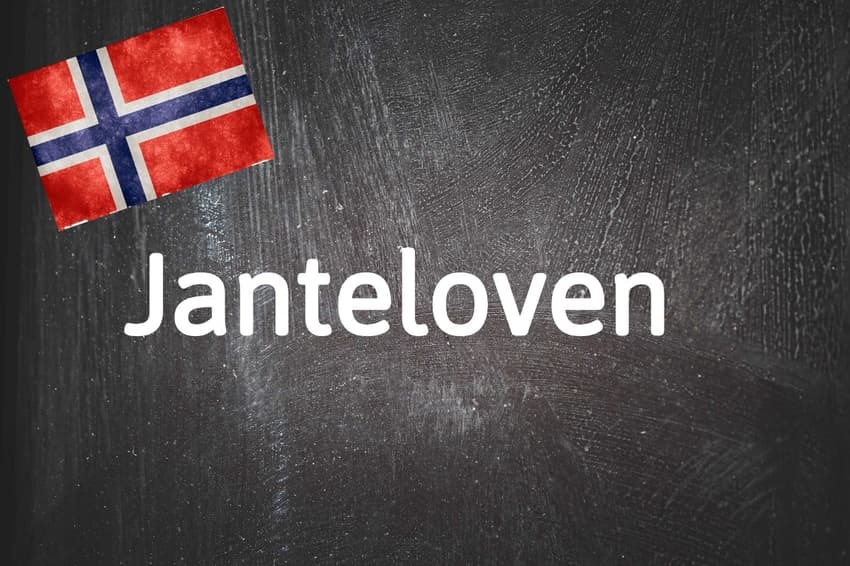Norwegian word of the day: Janteloven

Many point to the “law of Jante” as the basis for Scandinavian societies, but does this old set of norms and social values hold any weight in Norway nowadays?
What does Janteloven mean?
Lov means law in Norway. Words that end in en mean “the”, for example, hunden rather than hund for the “the dog”.
Jante is the name of a fictional Danish town in author Aksel Sandemose’s book “A Fugitive Crosses His Tracks” (En flyktning krysser sitt spor), published in 1933.
The book spawned a set of norms and social values heavily associated with both Denmark and Norway.
In the book, ten societal norms and principles are laid out. These are:
- You’re not to think you are anything special.
- You’re not to think you are as good as we are.
- You’re not to think you are smarter than we are.
- You’re not to imagine yourself better than we are.
- You’re not to think you know more than we do.
- You’re not to think you are more important than we are.
- You’re not to think you are good at anything.
- You’re not to laugh at us.
- You’re not to think anyone cares about you.
- You’re not to think you can teach us anything.
The small town’s laws were meant to represent the tyranny of the collective over the individual. The concept encourages humility and conformity and discourages boasting about personal accomplishments or, more generally, standing out.
Many point to this set of social norms as the reason why society in Scandinavia can feel so uniform at times.
These principles have been criticised for stifling individuality and ambition. The initial aim of the laws was to criticise the social norms of smaller Scandinavian towns and cities.
Despite them acting as criticism, many outside Scandinavia try to point to a link between the collective-first approach of Janteloven and the low levels of income inequality and high levels of happiness and wellbeing in Scandinavia.
However, there is very little evidence implying such a link. Norway has tried to move away from this association and declared the “Jante Laws” dead in 2005.
Whether they had an impact or still exist to this day is very much up for debate. Norwegians in the bigger cities, at least, are less afraid of standing out and expressing their own individuality and ambition.
Still, many will notice Norwegians driving the same cars, wearing the same clothes, and buying similar products for their homes.
Comments
See Also
What does Janteloven mean?
Lov means law in Norway. Words that end in en mean “the”, for example, hunden rather than hund for the “the dog”.
Jante is the name of a fictional Danish town in author Aksel Sandemose’s book “A Fugitive Crosses His Tracks” (En flyktning krysser sitt spor), published in 1933.
The book spawned a set of norms and social values heavily associated with both Denmark and Norway.
In the book, ten societal norms and principles are laid out. These are:
- You’re not to think you are anything special.
- You’re not to think you are as good as we are.
- You’re not to think you are smarter than we are.
- You’re not to imagine yourself better than we are.
- You’re not to think you know more than we do.
- You’re not to think you are more important than we are.
- You’re not to think you are good at anything.
- You’re not to laugh at us.
- You’re not to think anyone cares about you.
- You’re not to think you can teach us anything.
The small town’s laws were meant to represent the tyranny of the collective over the individual. The concept encourages humility and conformity and discourages boasting about personal accomplishments or, more generally, standing out.
Many point to this set of social norms as the reason why society in Scandinavia can feel so uniform at times.
These principles have been criticised for stifling individuality and ambition. The initial aim of the laws was to criticise the social norms of smaller Scandinavian towns and cities.
Despite them acting as criticism, many outside Scandinavia try to point to a link between the collective-first approach of Janteloven and the low levels of income inequality and high levels of happiness and wellbeing in Scandinavia.
However, there is very little evidence implying such a link. Norway has tried to move away from this association and declared the “Jante Laws” dead in 2005.
Whether they had an impact or still exist to this day is very much up for debate. Norwegians in the bigger cities, at least, are less afraid of standing out and expressing their own individuality and ambition.
Still, many will notice Norwegians driving the same cars, wearing the same clothes, and buying similar products for their homes.
Join the conversation in our comments section below. Share your own views and experience and if you have a question or suggestion for our journalists then email us at [email protected].
Please keep comments civil, constructive and on topic – and make sure to read our terms of use before getting involved.
Please log in here to leave a comment.